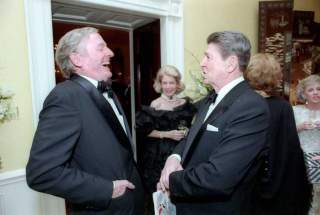Ronald Reagan, Firing Line, and the Triumph of the Right
An excerpt from Heather Hendershot's new book on William F. Buckley.
Part of the answer lies in Buckley’s persistently practical sense of the nature of realpolitik. He understood quite clearly that what politicians said they would do, actually wanted to do, and really could do were quite different things. Relatedly, he understood that candidates had to appeal to the mass of voters, and that the sesquipedalian discourse that appealed to Buckley would not be effective in the down-and-dirty trenches of political campaigning or, later, when one was actually in office. Reagan’s style was crowd-pleasing, and the man himself was patently telegenic. As “Draft Goldwater” strategist Clif White succinctly put it on Firing Line in 1987, “Ronald Reagan talks like the American people. That’s why they like him.”
Given his general approval of the conservative ethos behind the cornball style, Buckley could not seriously object to Reagan’s penchant for citing Mark Twain rather than, say, Edmund Burke. Indeed, in his 1989 farewell newspaper column Buckley went so far as to note with appreciation that Reagan had told 60 Minutes that he was currently reading George Burns’s book on Gracie Allen. If Jimmy Carter had admitted to 60 Minutes that in his spare time he was busy poring over a book on peanut farming, one cannot imagine Buckley being so charmed, notwithstanding his passion for peanut butter. What would show thin intellect in one man revealed lack of pretension in another. And, in fact, in 1967 Buckley had described Reagan’s mind as “very quick” and his wit as “mordant.”
Reagan’s easygoing style, unencumbered by intellectual nuance, was also appealing to Buckley and his confreres because it helped to mark him as not-Goldwater. Goldwater was not an egghead, but he was blunt, and he had clearly lost not only because of his politics but also because of the manner in which he represented his politics. While liberals saw Goldwater’s defeat as a referendum on right-wing conservatism, right-wing conservatives of Buckley’s ilk were eager to spin the defeat as a first step toward the eventual victory of the right. What was needed was a candidate who did not draw so much support from the overt extremists and, just as important, a candidate who was a smooth talker likely to make fewer gaffes on the campaign trail and who could project a positive image. As Theodore White had observed in chronicling the 1964 campaign, Goldwater had been forced to fight a negative image coming right out of the gate: “Goldwater was cast as defendant. He was like a dog with a can tied to his tail—the faster he ran, the more the can clattered.” Reagan’s record in California made him the darling of conservatives and the foe of liberals, and, to his great advantage, he did not have Goldwater’s heavy “Doctor Strangewater” image to fight.
Reagan’s gubernatorial victory in California in 1966, then, signaled right-wing conservatism as a phoenix emerging from the embers of the Goldwater conflagration. Moreover, California was a huge state, with forty electoral votes, a complicated budget, and a history of campus upheaval. If a right-wing conservative could succeed as governor in such a state, he (and his handlers) could quite reasonably build a case for his qualifications to be president, needing only to prove that he had foreign policy chops. Here’s where Buckley lent a hand, both in his journal of opinion and on his TV program.
Heather Hendershot is professor of film and media at Massachusetts Institute of Technology. She is the author of Saturday Morning Censors: Television Regulation before the V-Chip, Shaking the World for Jesus: Media and Conservative Evangelical Culture, and What’s Fair on the Air? Cold War Right-Wing Broadcasting and the Public Interest.
Image: President Ronald Reagan and conserative author/commentator William F. Buckley, Jr. at President Reagan's birthday party, White House Residence. Wikimedia Commons/The White House

